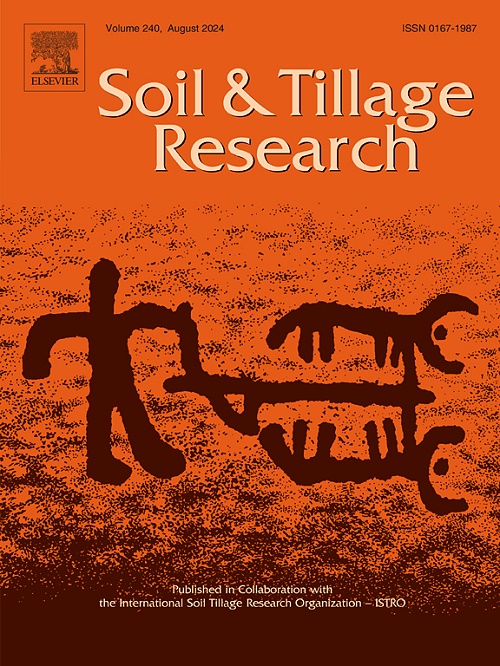Wood gasification biochar enhances soil carbon sequestration without affecting greenhouse gas fluxes or wheat yield in sub-alkaline soil
IF 6.1
1区 农林科学
Q1 SOIL SCIENCE
引用次数: 0
Abstract
The agricultural sector plays a vital role in mitigating soil greenhouse gas (GHG) emissions and enhancing carbon sequestration. One promising approach is wood biochar produced through gasification, which generates both syngas and stable biochar. This study evaluates the effects of wood gasification biochar (WGB) on subalkaline soil under Mediterranean climate conditions. A field experiment was conducted over two cropping years, monitoring soil N2O, CH4, and CO2 fluxes, along with temperature and water content, for two treatments: unamended wheat (control) and wheat amended with 60 Mg ha−1 of WGB. Additionally, soil physicochemical properties at 0–10 cm and 10–40 cm depths and wheat yield were assessed. In the WGB treatment, soil N2O, CH4, and CO2 fluxes remained unchanged, though a slight increase in soil temperature (+0.1 °C) was observed. No significant differences were detected in soil pH, total and ammoniacal nitrogen, bulk density, or cation exchange capacity. However, soil nitric nitrogen levels significantly decreased. Soil carbon stock increased 2.2-fold at 0–10 cm and 1.4-fold at 10–40 cm, with this effect persisting into the second year. Wheat yield remained comparable between treatments, averaging ∼2.0 Mg ha−1 (control) vs. ∼1.8 Mg ha−1 (WGB) in year one and ∼3.9 Mg ha−1 vs. ∼3.1 Mg ha−1 in year two. These findings indicate that wood gasification biochar enhances soil carbon sequestration without affecting GHG emissions or wheat yield, reinforcing its potential for sustainable soil management and circular agriculture.
在亚碱性土壤中,木材气化生物炭在不影响温室气体通量和小麦产量的情况下增强了土壤固碳能力
农业部门在减少土壤温室气体排放和加强碳固存方面发挥着至关重要的作用。一种很有前途的方法是通过气化生产木材生物炭,这种方法既能产生合成气,又能产生稳定的生物炭。本研究评价了地中海气候条件下木质气化生物炭(WGB)对亚碱性土壤的影响。在两个种植年期间进行了一项田间试验,监测了两种处理的土壤N2O、CH4和CO2通量,以及温度和含水量,这两种处理是:未添加小麦(对照)和添加60 Mg WGB的小麦。此外,还评估了0-10 cm和10-40 cm深度土壤的理化性质和小麦产量。在WGB处理下,土壤N2O、CH4和CO2通量保持不变,但土壤温度略有升高(+0.1 °C)。土壤pH、总氮和氨态氮、容重和阳离子交换容量无显著差异。土壤氮含量显著降低。土壤碳储量在0 ~ 10 cm增加2.2倍,在10 ~ 40 cm增加1.4倍,这种效应持续到第二年。小麦产量在不同处理之间保持相当,第一年平均为~ 2.0 Mg ha - 1(对照),第二年平均为~ 1.8 Mg ha - 1 (WGB),第二年平均为~ 3.9 Mg ha - 1,第二年平均为~ 3.1 Mg ha - 1。这些发现表明,木材气化生物炭在不影响温室气体排放或小麦产量的情况下增强了土壤固碳能力,增强了其可持续土壤管理和循环农业的潜力。
本文章由计算机程序翻译,如有差异,请以英文原文为准。
求助全文
约1分钟内获得全文
求助全文
来源期刊

Soil & Tillage Research
农林科学-土壤科学
CiteScore
13.00
自引率
6.20%
发文量
266
审稿时长
5 months
期刊介绍:
Soil & Tillage Research examines the physical, chemical and biological changes in the soil caused by tillage and field traffic. Manuscripts will be considered on aspects of soil science, physics, technology, mechanization and applied engineering for a sustainable balance among productivity, environmental quality and profitability. The following are examples of suitable topics within the scope of the journal of Soil and Tillage Research:
The agricultural and biosystems engineering associated with tillage (including no-tillage, reduced-tillage and direct drilling), irrigation and drainage, crops and crop rotations, fertilization, rehabilitation of mine spoils and processes used to modify soils. Soil change effects on establishment and yield of crops, growth of plants and roots, structure and erosion of soil, cycling of carbon and nutrients, greenhouse gas emissions, leaching, runoff and other processes that affect environmental quality. Characterization or modeling of tillage and field traffic responses, soil, climate, or topographic effects, soil deformation processes, tillage tools, traction devices, energy requirements, economics, surface and subsurface water quality effects, tillage effects on weed, pest and disease control, and their interactions.
 求助内容:
求助内容: 应助结果提醒方式:
应助结果提醒方式:


